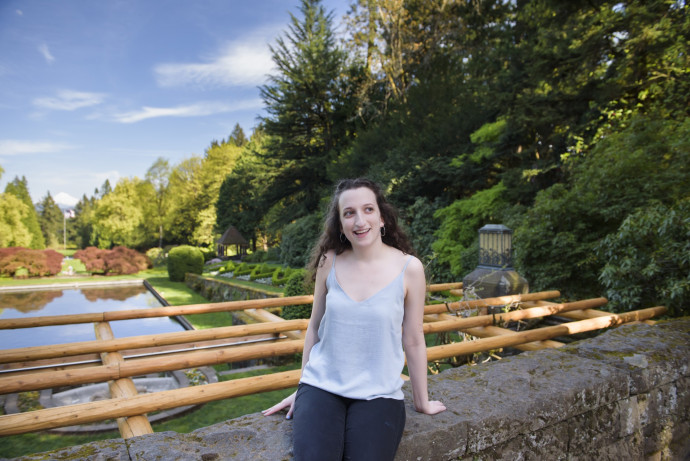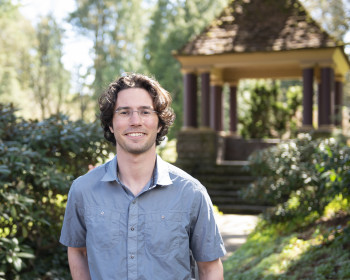Senior Speaker: Mimi Hovila
Mimi Hovila BA ’18 will address graduates at the College of Arts and Sciences commencement on May 5.

Mimi Hovila BA ’18 will be the student speaker at the College of Arts and Sciences commencement on May 5. A committee of seniors, staff, and faculty selected Mimi, a studio art major and English minor from Lake Forest Park, Washington, as the winner of this year’s Senior Speaker Competition.
We talked to Mimi about taking sculpture with Assistant Professor of Art Jess Perlitz, emceeing open mic nights at the Rusty Nail Co-op, and her advice to the Class of 2018.
What three words best describe your Lewis & Clark experience?
Earnest, demanding, revealing.
What made you want to come to Lewis & Clark?
I was actually a little resistant to the idea of Lewis & Clark initially! Through no fault of the school’s, though—my older sister Emma was a student here, and as a hardheaded teen I was eager to find “my own” place. But I came one weekend to visit her when I was 16 and it really won me over, so I ended up applying to L&C early action.
What was your favorite class? How did it expand your knowledge?
I’ve had a lot of incredible classes but I think my favorite has to have been Jess Perlitz’s special topics in sculpture course, Useful Art. In the art department, the special topics courses are our opportunity to look at one subject through many lenses, as opposed to exploring multiple subjects within a single medium or discipline. I also think they’re a great way for nonmajors to engage with art in a manner that’s relevant to their studies. It was such a cool experience to learn about all these different kinds of art practices, and working on a variety of projects allowed us to push ideas beyond our default modes. I used to feel a lot of pressure to find my own particular “style” of art, something unique or recognizable. Through this and my other classes, though, I’ve learned not to limit myself for the sake of having a signature.
What was the best thing you were involved with at L&C outside of class?
That’s a tough one! I look back really fondly on the Rusty Nail Co-op and especially its open mic nights. I started emceeing those late in my freshman year, and they became such an important fixture in my life. Having a set time every other week to share work was really motivating and supportive. It could be goofy and disorganized or incredibly sincere and touching—usually, it was some combination of both. Aside from that, I’ve worked at a local organic juice bar (how Portland!), helped organize a sex education workshop with Campus Living and She-Bop Portland, participated in Art Club, and worked as a graphic designer for the music department.
Do you feel as though L&C has changed you?
Yes! I mean, duh, right? I don’t really know how to answer this question—what metric do we use for change? How do you quantify that sort of thing? I would’ve changed in these last four years regardless, but I’m grateful that I chose L&C to facilitate it. Growth can come with pain as well as joy, and the people that I’ve encountered here fostered me through both.
Do you have any graduation plans?
After I sleep for 48 straight hours, you mean? I definitely have a few, but I’m mostly focusing on how best to transition out of being a student. Like a lot of my peers, I went to college directly from high school—and while I don’t regret that, the coming months/years are my first opportunity to live my life without an educational structure. I do plan to pursue a master’s degree eventually: I’m really passionate about human sexuality, public health, and sex education, so I’d love learning more about that field. My dream career would be working with adolescents and developing comprehensive sex ed curricula for public schools. And of course, art is part and parcel of who I am. I don’t think I could give it up if I tried.
The future is unknowable and terrifying but also really, really exciting. For now maybe I’ll set up a retirement account, or take up jogging. But probably not jogging.
What message do you hope to convey to your fellow graduates at commencement?
This is a time in our lives where we’re getting told so much about what lies ahead and how we ought to move forward. I don’t begrudge the help, but it can become almost like white noise. I can’t imagine that I’ll have much advice for my peers that they haven’t all heard a million times before. Plus, I wouldn’t presume to have any special insight. The best thing that I can do is take a moment to acknowledge the communities we have made and the specialness of each connection. Being ready to move on means being ready to make mistakes, and it’s vital that we have people in our corner when those mistakes happen. That’s what we get to take with us into the next who-knows-what.
More Newsroom Stories
Public Relations is located in McAfee on the Undergraduate Campus.
MSC: 19
email public@lclark.edu
voice 503-768-7970
Public Relations
Lewis & Clark
615 S. Palatine Hill Road MSC 19
Portland OR 97219

